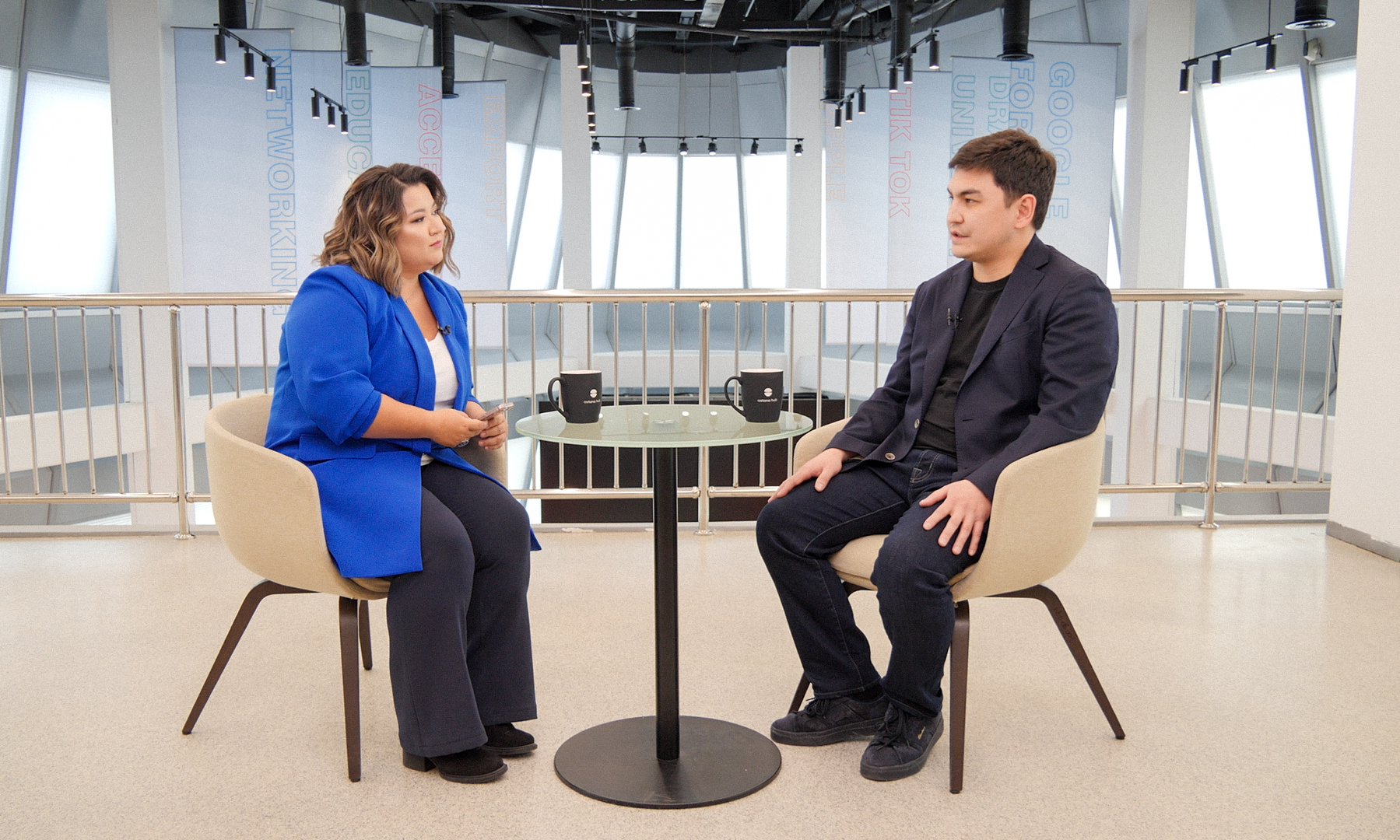ASTANA — Nestled within the bustling EXPO district on the left bank of Kazakhstan’s capital, the Astana Hub stands as a beacon of innovation and progress in the heart of Central Asia. In the exclusive interview with The Astana Times, its founding CEO Magzhan Madiyev reflected on the hub’s journey, accomplishments, and ambitions moving forward.

The Astana Hub’s founding CEO, Magzhan Madiyev spoke to The Astana Times correspondent Aida Haidar. Photo credit: The Astana Times.
Celebrating Milestones: Astana Hub’s Fifth Anniversary
Celebrating its fifth anniversary, the hub has achieved remarkable success in a relatively short period, instilling hope and motivation among young entrepreneurs and programmers not only in Kazakhstan but also in neighboring countries.

Magzhan Madiyev. Photo credit: The Astana Times.
Madiyev shared insights into the tech ecosystem’s evolution as it marked its fifth milestone. Astana Hub has blossomed into a vibrant community of tech enthusiasts, hosting over 1,400 tech companies and nurturing numerous startups within its ecosystem. Notably, these entities collectively generate nearly $900 million in revenue annually, a testament to the hub’s growing impact on the regional tech landscape. Looking ahead, Madiyev expressed ambitions for Astana Hub to surpass the $1 billion revenue mark set by President Kassym-Jomart Tokayev in his 2023 state-of-the-nation address—a pivotal goal for the organization.
Reflecting on the past year’s achievements, Madiyev underscored the success of initiatives such as the Digital Bridge forum, which facilitated 29 agreements on IT and innovation, fostering collaboration between industry stakeholders and government entities and the Meet the Drapers program.
“I think it’s one of the most significant programs within the Astana hub ecosystem because we provide an opportunity to our youth to go to Silicon Valley and to gauge their chances to build into a global company. We are proud that we brought 30 startups not only from Kazakhstan but from the whole region, I mean, the Central Asian region plus Mongolia, Azerbaijan, and Türkiye, to Draper University in the middle of Silicon Valley, and some of them raised some funds,” he said.
Astana Hub’s partnership with Draper University led to success stories like Citrix, an intelligent transport information and navigation system, securing significant investments from renowned venture investor Tim Draper. Additionally, the establishment of the SilkRoad Innovation Hub in Silicon Valley underscores Astana Hub’s commitment to nurturing global partnerships and fostering cross-border collaboration among startups.
Madiyev emphasized Astana Hub’s vision of becoming an international hub for tech talent, transcending national boundaries to attract innovators from across the region and beyond. Including countries like Mongolia and Türkiye in programs like Meet the Drapers underscores Astana Hub’s role as a catalyst for regional cooperation and innovation.
“Today, Astana is recognized across these regions as a destination for tech talent. So it’s beneficial for us, even if they don’t stay here long,” he added.
Digital Nomad Visa: Transforming Kazakhstan into a Tech Hub
By cultivating a dynamic community of tech enthusiasts, Astana Hub aims to position Kazakhstan as a preferred destination for tech talent, enriching the local ecosystem and facilitating global knowledge exchange. In response to Kazakhstan’s aspirations to become a hub for digital nomads and AI specialists, Madiyev discussed the introduction of the digital nomad visa.
President Tokayev’s recent directive to initiate a Digital Nomad Residency program underscores Kazakhstan’s commitment to keeping pace with contemporary trends and becoming a global hub for digital nomads and AI specialists. Madiyev noted that the roots of this program lie within Astana Hub.
“It’s one of the initiatives, which started at Astana hub. I could explain why. As I mentioned, talent acquisition is one of the main parts of our job. We realize that this is not easy for foreigners to come and stay in Kazakhstan for a while or for a long period of time. There are some restrictions and migration procedures. So we had some instructions from the Minister of Digital Development and the government to solve this bottleneck,” he said.
Recognizing the challenges faced by foreign talent in navigating migration procedures, Astana Hub collaborated with government agencies to design the digital nomad residency program, reflecting Kazakhstan’s dedication to creating a welcoming environment for global talent.
As Astana Hub continues to pioneer innovation and collaboration, Madiyev remains optimistic about the future. With a focus on nurturing talent, fostering international partnerships, and embracing emerging trends, Astana Hub is poised to shape the future of tech innovation in Central Asia and beyond.
For the complete conversation, stay tuned for the release of the full video interview on The Astana Times’ YouTube channel in March.
